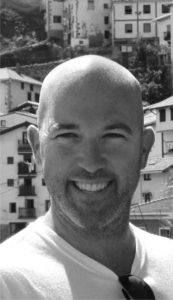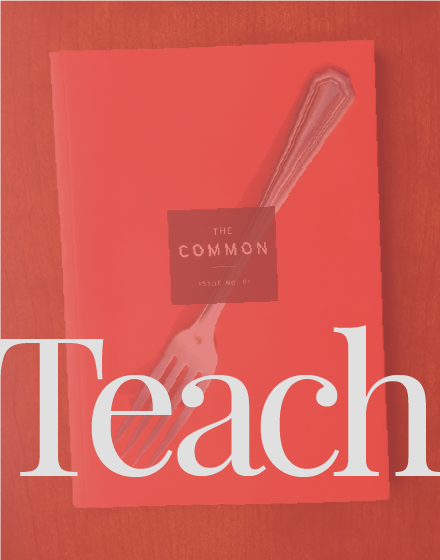 Curtis Bauer
Curtis Bauer
Associate Professor, Texas Tech University
“I liked the idea of having the opportunity to not only introduce the students to a literary journal that publishes contemporary writers who are writing about the course’s topic but also so they might have the opportunity to meet with the editor of the journal (via Skype) to discuss how she selects pieces for the journal and to discuss issues of craft and style.”
Curtis Bauer is the author of two poetry collections, most recently The Real Cause for Your Absence. He is also a translator of poetry and prose from the Spanish; his publications include the full-length poetry collections Eros Is More, by Juan Antonio González Iglesias and From Behind What Landscape, by Luis Muñoz (forthcoming from Vaso Roto Ediciones in 2015). He is the publisher and editor of Q Avenue Press Chapbooks, the Spanish Translations Editor for From the Fishouse, and “New Spanish Poets” Series Editor for Vaso Roto Ediciones. He teaches Creative Writing and Comparative Literature at Texas Tech University in Lubbock, Texas.
 Rebecca Chace
Rebecca Chace
Director of Creative Writing, Fairleigh Dickinson University
“I used The Common in my undergraduate Creative Nonfiction class. Teaching The Common introduced my students to contemporary fiction, poetry, and creative nonfiction. As we usually read more ‘classic’ examples of creative nonfiction, this was a great way to let them familiarize themselves with a range of contemporary work. Further, as they are creative writing majors, it gave them a sense of the kind of literary journals that they can aspire to be published in themselves when they are ready to begin to submit their own work to journals. Using The Common in the classroom was a great success, and I plan to do this again in the future.”
Rebecca Chace is the author of: Leaving Rock Harbor (novel): “Editor’s Choice” New York Times Book Review, finalist for the 2010 New England Book Award; Chautauqua Summer (memoir): New York Times Book Review “Notable Book,” “Editor’s Choice”; Capture the Flag (novel), Ms. Chace adapted for the screen with director Lisanne Skyler; the Showtime Tony Cox Screenwriting Award (Short Film), Nantucket Film Festival, 2010. She has written for the New York Times Magazine, New York Times Sunday Book Review, the Huffington Post, NPR’s All Things Considered, and other publications. She is Director of Creative Writing at Fairleigh Dickinson University and also teaches in their MFA Creative Writing Program. She is a 2014 recipient of a Grace Paley Fiction Fellowship at the Vermont Studio Center and a current writing fellow of the Wertheim Study at the New York Public Library.
 Martha Cooley
Martha Cooley
Associate Professor of English, Adelphi University
“Using The Common in my first-year seminars at Adelphi University has been fun, fruitful, and helpfully startling for these classes, in which we read a lot of short fiction and essays. To begin with, most of my first-year students haven’t ever seen a serious literary journal before. So we start with the basics: the physical object itself. The students always make note of the silky textures of The Common’s covers and the striking quality of its cover graphics—and they want to hear about how these covers get made. We then explore the table of contents, which gives me a chance to talk about editorial decision making; about literary categories, genres, and trends; about authors and their relations with editors and one another; about place as both an abstraction and an on-the-ground reality; and about the visual elements that enrich each issue of the journal.
All this happens before we begin reading. I’ve assigned specific pieces (stories, poems, and essays); I’ve also let the students browse and then respond to whatever attracts them. Both approaches yield good results: the students engage freely and deeply with the material, aware that they’re reading something that’s neither a book nor an online offering but something other, and special. The contributors’ notes, too, are an education for my students, who enjoy seeing how various authors and artists present themselves to the public. Each time I’ve used The Common in my first-year seminars, the students have responded strongly to its editorial mandate and approach, its visual elements, and the excellent writing each issue contains. And I’ve found that the journal is an excellent kick-start for a wide range of discussions about art, politics, and life.”
Martha Cooley is an Associate Professor of English at Adelphi University. She is the author of the novels The Archivist (a national bestseller that also appeared in a dozen foreign markets) and Thirty-Three Swoons, both published by Little, Brown. Her short fiction, essays, and translations can be found in numerous literary journals. In April 2015, her translation (with Antonio Romani) of Time Ages in a Hurry, a collection of stories by the eminent Italian author Antonio Tabucchi, will be published by Archipelago Books.
 Ralph Sneeden
Ralph Sneeden
English Teacher, Exeter Humanities Institute
“As students travel through their careers at Exeter, their exploration of personal narrative writing is augmented and opened by braiding reflection into the fabric of their projects; we let them choose those moments when “showing” can’t do it all. But, for me, place remains the anchor, and that’s why The Common appeals to me so intensely, pedagogically and aesthetically.”
“The Common is a trove, not only for offering students a range of voices and how they might encounter or craft the rudiments of description, but for ambitious hybrids of reflective writing, too.”
Ralph Sneeden is a founding leader of the Exeter Humanities Institute (since 1999). He joined the English Department at Exeter in 1995 and currently serves as the CPD (Continuing Professional Development) Coordinator, guiding senior faculty through the review process. He has been teaching high school since 1983, and has led discussion-based teaching workshops across the US, Canada and also in Chile, the UK, and the Philippines. His writing has appeared recently or is forthcoming in magazines including Agni, The American Poetry Review, The Common, Harvard Review, Independent School Magazine, The New Republic, POETRY, Prague Revue, Slate, Southern California Review, and others. He also directs the Damariscotta Lake Writers’ Conference, a conference/colony in Maine for teachers who write.
 Julian Zabalbeascoa
Julian Zabalbeascoa
Adjunct Instructor, University of Massachusetts Lowell
“By communing with the works found in The Common (works in which, according to Editor in Chief Jennifer Acker, “people react against their environments”) and entering into another’s consciousness, students are able to reflect upon their own stories of change and new beginnings, of leaving home and those friendships that helped shape and fortify them so that they could venture into the unknown, into Lowell, into all that college has to offer. The Common returns them to this, makes them more aware of this moment and of the role of place in their lives. It deepens this experience, enriches it, and—ideally—makes them more here now.”
Julian Zabalbeascoa is an adjunct instructor in the University of Massachusetts Lowell’s Honors College and, with Sean Conway, leads the Honors College’s study abroad program in San Sebastian, Spain. His short stories have recently appeared or are forthcoming in Glimmer Train (1st Place Winner in the April 2014 Very Short Fiction contest), Ploughshares, Shenandoah, and Sonora Review, and will be translated into Basque by Asun Garikano for the magazine Erlea.
« Return to Teach The Common

 Curtis Bauer
Curtis Bauer Rebecca Chace
Rebecca Chace Martha Cooley
Martha Cooley Ralph Sneeden
Ralph Sneeden Julian Zabalbeascoa
Julian Zabalbeascoa